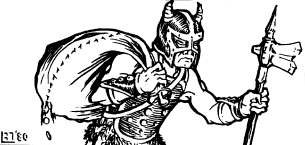| Part 4: The Adventure | ||
| CONTENTS Home Part 1: Intro Part 2: PC Info Part 3: Spells Part 4: Adventure Part 5: Encounter Part 6: Monsters Part 7: Treasure Part 8: DM |
 Begining the Adventure When players have rolled up their characters and bought their equipment, the DM will describe the background of the adventure. This might include information about the place the characters start from, the names of any NPC companions or retainers they will have, and some rumors about the dungeon the party is going to explore. The best size for an adventure party is 6-8 characters, enough to handle the challenges which will be faced, but not too many to become disorganized or to ruin chances to surprise the monsters. Before entering a dungeon, the players should arrange their characters in a marching order (the order position in which the characters in a party explore the dungeon; who's scouting in front, searching the middle, and guarding the rear). One player should be chosen to tell the DM about the plans and actions of the party. This player is called the Caller. One player should also draw a map of the dungeon as it is being explored, this player is called the Mapper. Time Time in D&D adventures is given in Turns of ten minutes each. A Round used in encounters and combat situations, it is only ten seconds. Summary: Movement Movement Summary: Light A torch or lantern will cast light 30' in all directions. A torch burns out in 6 turns (1 hour); a lantern filled with one flask of oil burns for 24 turns (4 hours). Infravision is the ability to see heat patterns. Most demi-humans and non-human monsters have infravision. Doors Locked doors must be picked locked by a thief. To force open an unlocked door roll 1d6; a roll of 1 or 2 means the door is forced open. (Strength adjustment can be used but the number needed can never be less than 1 nor greater than 1-5.) Any character has a 1 in 6 chance of finding a secret door. (Elves have a 2 in 6 chance). Only one chance and it takes one turn to search for a secret door. A character can listen at a door. Roll 1d6, a result of 1 (1 or 2 for demi-humans) means that the character hears any noises beyond the door. Only once per door. Traps Dungeons often contain traps, such as a trap door in the floor which springs open when a character walks over it. If any character does something which could trigger a trap (such as walking over a certain point), the trap will be sprung on a roll of 1-2 (on 1d6). The DM must check for each character that is threatening to trigger the trap. Any character has a 1 in 6 chance of finding a trap when searching for one in the correct area. Dwarves have a 2 in 6 chance. This takes one full turn and each character can only check once to find each trap. Experience Points
|
|